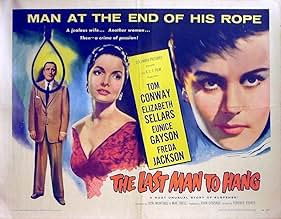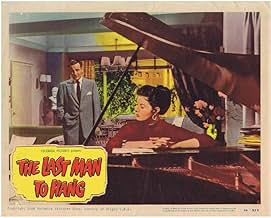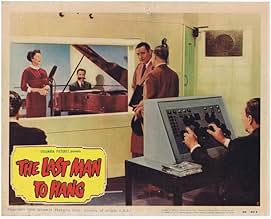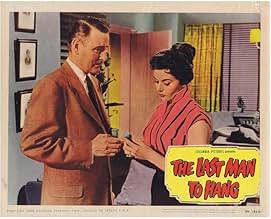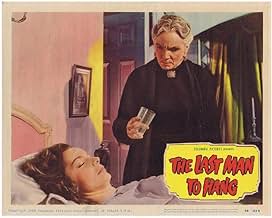Füge eine Handlung in deiner Sprache hinzuSir Roderick Strood is on trial for the murder of his wife.Sir Roderick Strood is on trial for the murder of his wife.Sir Roderick Strood is on trial for the murder of his wife.
Empfohlene Bewertungen
Tom Conway is on trial for the murder of his wife. The facts seem to suggest a degree of responsibility, if not, indeed, culpability; he gave her sleeping pills which resulted in her death. However, did he know that? Was the overdose accidental? Did she commit suicide? A jury has to decide whether he will hang, even as Parliament debates the end of the death penalty.
It's an interesting story, because of the ambiguities in the handling, and Terence Fisher has never done better. I would like to extend some of the credit to Maurice Elvey, who is credited, along with the author of the book it is based on, with the adaptation.
The last two minutes of the movie make no sense to me.
It's an interesting story, because of the ambiguities in the handling, and Terence Fisher has never done better. I would like to extend some of the credit to Maurice Elvey, who is credited, along with the author of the book it is based on, with the adaptation.
The last two minutes of the movie make no sense to me.
Had "The Last Man to Hang" not ending on an incredibly improbable and unnecessary twist, I probably would have given it an 8. It was well acted, realistic an very well written. But, with the twist ending, I think it dropped the film to an overall score of 6.
Roderick (Tom Conway) is married to a difficult and neurotic wife. Possibly as a result, he began an affair with another woman. The wife, when told later he wanted a divorce, behaved quite emotionally and irrationally...more so than would be usual in a case like this. Soon after, she is dead from an apparent overdose of a strong sleeping pill....and the husband is being charged for it, as he admits having given her a dose of sleeping pills. While he does not in any way deny this, he does deny that he knew she'd already been given a dose. In other words, he contends he never tried to kill her. It's a case of he says/she says and the film shows not just the events leading up to the trial but the trial and jury deliberations....as well as a completely unnecessary ending that was cool but wasn't logical...leaving MANY questions unanswered...too many to be an ending anyone could enjoy.
Up until the ending, I loved the film. Why, then, come up with such a ridiculous twist which actually contracts much of the film...or at least needs a lot of explaining...which you never got in the movie! Frustrating...especially when the rest of the production was so strong.
By the way, she film showed something that confused me and is perhaps a way that British and American juries differ. In one scene, before the case was handed to the jury to decide, they show the jurors in a room discussing the case and what they thought about Roderick's apparent guilt. If such a meeting and conversations occurred in an American trial, it would be grounds for a mistrial, as jurors are NOT allowed to discuss the case until the defense and prosecution have concluded. It is possible the American and British systems are the same and an editing error placed this scene in the wrong place....instead of about 10 minutes later. I just don't know.
Roderick (Tom Conway) is married to a difficult and neurotic wife. Possibly as a result, he began an affair with another woman. The wife, when told later he wanted a divorce, behaved quite emotionally and irrationally...more so than would be usual in a case like this. Soon after, she is dead from an apparent overdose of a strong sleeping pill....and the husband is being charged for it, as he admits having given her a dose of sleeping pills. While he does not in any way deny this, he does deny that he knew she'd already been given a dose. In other words, he contends he never tried to kill her. It's a case of he says/she says and the film shows not just the events leading up to the trial but the trial and jury deliberations....as well as a completely unnecessary ending that was cool but wasn't logical...leaving MANY questions unanswered...too many to be an ending anyone could enjoy.
Up until the ending, I loved the film. Why, then, come up with such a ridiculous twist which actually contracts much of the film...or at least needs a lot of explaining...which you never got in the movie! Frustrating...especially when the rest of the production was so strong.
By the way, she film showed something that confused me and is perhaps a way that British and American juries differ. In one scene, before the case was handed to the jury to decide, they show the jurors in a room discussing the case and what they thought about Roderick's apparent guilt. If such a meeting and conversations occurred in an American trial, it would be grounds for a mistrial, as jurors are NOT allowed to discuss the case until the defense and prosecution have concluded. It is possible the American and British systems are the same and an editing error placed this scene in the wrong place....instead of about 10 minutes later. I just don't know.
A very wooden, ageing Tim Conway, looks totally disinterested in his part and also makes little effort to engage the audience about his feelings towards his murdered wife. Since he seems to show little emotion about his own circumstances of being on trial for his life, and the fact that he 'wanders' through the film almost tight lipped, the film becomes lifeless and aimless! The only real interest comes in the courtroom scenes. Give this film a miss. A wasted opportunity of what could have been a dramatic and nail biting film. Instead it induces sleep!
Directed by Terence Fisher, The Last Man to Hang from 1957 stars Tom Conway as a man accused of killing his wife Daphne (Elizabeth Sellars).
As others have pointed out, this was an okay film until the ridiculous twist at the end which made no sense. At all.
Conway plays Sir Roderick Strood, introduced to a soprano (Eunice Grayson) who is singing Lucia on the radio. He falls for her and wants to divorce his wife. At one point, he and Daphne fight and she pulls a gun, evidently to kill herself, which he wrestles away from her. The gun goes off, bringing the maid (Freda Jackson) who hates Strood. No one is hurt.
Strood gives Daphne sleeping tablets, and he is accused of killing her, since the maid had given her a sedative and claims he knew it.
We see the jurors receiving jury duty summons. One of them is Anthony Newley. You think it's going to be a story about the jurors.
This movie is all over the place. The end is terrible.
As others have pointed out, this was an okay film until the ridiculous twist at the end which made no sense. At all.
Conway plays Sir Roderick Strood, introduced to a soprano (Eunice Grayson) who is singing Lucia on the radio. He falls for her and wants to divorce his wife. At one point, he and Daphne fight and she pulls a gun, evidently to kill herself, which he wrestles away from her. The gun goes off, bringing the maid (Freda Jackson) who hates Strood. No one is hurt.
Strood gives Daphne sleeping tablets, and he is accused of killing her, since the maid had given her a sedative and claims he knew it.
We see the jurors receiving jury duty summons. One of them is Anthony Newley. You think it's going to be a story about the jurors.
This movie is all over the place. The end is terrible.
Terence Fisher is famous for directing dozens of popular genre films, notably the Hammer horror classics, but his ponderous, very boring treatment of this stupid courtroom drama is incompetent. I nearly dozed off early on.
The screenplay is at fault, with several flashbacks and telegraphed clues that bog things down, and even at 71 minutes of running time this B-level British feature from Columbia seems padded. In particular, showing the family life of the jurors as they receive their court summons is totally extraneous footage.
For such a nothing movie it has 35 credited roles, mostly flatly performed, especially Tom Conway's walk-through as the lead. The unconvincing final plot twist is asinine, more appropriate to a Z-level exploitation movie than a major production that has a misleading subplot about capital punishment on the verge of being abolished (hence the title), yet that did not occur until it was suspended for murder nine years after the film was released.
The screenplay is at fault, with several flashbacks and telegraphed clues that bog things down, and even at 71 minutes of running time this B-level British feature from Columbia seems padded. In particular, showing the family life of the jurors as they receive their court summons is totally extraneous footage.
For such a nothing movie it has 35 credited roles, mostly flatly performed, especially Tom Conway's walk-through as the lead. The unconvincing final plot twist is asinine, more appropriate to a Z-level exploitation movie than a major production that has a misleading subplot about capital punishment on the verge of being abolished (hence the title), yet that did not occur until it was suspended for murder nine years after the film was released.
WUSSTEST DU SCHON:
- Wissenswertes[Foreword] This film contains scenes that some viewers may find distressing.
- PatzerWhen Mrs. Tucker identifies the dead body of Daphne the body is breathing.
- Zitate
The Jury At Home: Lucy's Mother: Oh - I wish your father had killed me and not left me here to die all alone!
Top-Auswahl
Melde dich zum Bewerten an und greife auf die Watchlist für personalisierte Empfehlungen zu.
Details
- Laufzeit1 Stunde 15 Minuten
- Farbe
- Seitenverhältnis
- 1.85 : 1
Zu dieser Seite beitragen
Bearbeitung vorschlagen oder fehlenden Inhalt hinzufügen

Oberste Lücke
By what name was The Last Man to Hang (1956) officially released in India in English?
Antwort
